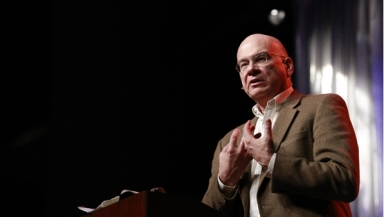
Some people say that the existence of evil disproves the existence of God – yet this contradicts itself. It's something that's often called the "moral argument".
This can be summarised more cleverly by philosophers such as William Lane Craig. He puts it in this way:
1) If God does not exist then objective moral values do not exist. In other words, moral values that are true and absolute, not affected by culture or progress or anything else, cannot exist if God does not exist.
2) Actually, evil does exist. The Holocaust is one example, but there are many more.
3) Therefore objective moral values do actually exist, that is to say, it is true that some things are evil and some things are good. There's a strong argument that objective moral values do exist. For example, the Holocaust is always evil and wrong, whatever culture you live in and whatever your beliefs – even if Nazis had taken over the whole world and everyone thought the Holocaust was right, it would still most definitely be wrong.
4) Therefore, God exists. If evil and good are real concepts – in what realm do they exist? In other words, if evil exists, then there is a genuine reality called morality. After all, if not, where does this morality reside? Not in atoms and molecules. It's something other-worldly, beyond this world, that is the definition of good. When you think what on earth this could be, it starts to look like God. Take a look at William Lane Craig's website if you want more detail on this.
So, when atheists realise this, sometimes they decides to call evil "suffering" instead. They argue that there is pointless, needless suffering in the world, so God can't exist. Evil might be there, but there's no point to it.
What would classify as "pointless" or "unnecessary" suffering? As Timothy Keller points out, just because someone does not see the point of suffering does not make the suffering pointless.
Keller says: "Tucked away within the assertion that the world is filled with pointless evil is a hidden premise, namely that if evil appears pointless to me, then it must be pointless. This reasoning is, of course, fallacious. Just because you can't see or imagine a good reason why God might allow something to happen, doesn't mean there can't be one.
"Again we see lurking within supposedly hard-nosed scepticism, there is an enormous faith in one's own cognitive faculties. If our minds can't plumb the depths of the universe for good answers to suffering, well, then, there can't be any! This is blind faith of a high order."
Indeed, it is the atheist who lives by the blind faith that he mistakenly attributes to the theist. He says, "If I cannot understand it, then it cannot be there".
The Christian is not someone who doesn't question or think, but on some questions, will say 'I don't really know'. We might not understand how some of the terrible things in the world could be allowed to happen, but it doesn't mean that there isn't a good reason.
Augustine really helped me with this question. Did God create a perfect world and then get it wrong? Or did God create a perfect world which he allowed to go wrong? Was the world that God created really perfect?
This is Augustine's response (I'm making it simple):
- God created all things.
- Evil is not a created thing – it is the absence of good.
- God did not create evil, but permits it for the ultimate good.
So Augustine says that evil was not created by God, but that he permits it, for reasons that we can't always understand. This includes the devil. He was created by God, but he was not created evil – he turned away from the good and became evil. Even this was permitted by God for the ultimate good.
Augustine wrote: "In the universe, even that which is called evil, when it is regulated and put in its own place, only enhances our admiration of the good; for we enjoy and value the good more when we compare it with the evil. For the Almighty God, who, as even the heathen acknowledge, has supreme power over all things, being himself supremely good, would never permit the existence of anything evil among His works, if he were not so omnipotent and good that he can bring good even out of evil." (Enchiridion ch.11)
The question is, who is in the best position to know what is for the best? Humanists argue that we humans are. But if God is real, then only God can know truly what is for the best.
Atheists may object to God's tolerance for suffering, but they do not understand why God would allow it. In many instances it is humans who create the suffering, and this is not how God wants them to use their free will. But yet God can still turn it into something that works out for good.
"For he judged it better to bring good out of evil, than not to permit any evil to exist," says Augustine, Enchiridion ch. 27. Tomorrow we'll look at what some of the possible reasons might be.
David Robertson leads St Peter's Dundee and is the director of Solas CPC. This is the second of three articles based on talks given at this year's Keswick Convention. Click here to hear the full talk.
Keswick's mission is to unite with Christians around the world to commit to three big priorities for our lives and churches – hearing God's Word, becoming like God's Son, and fulfilling God's mission.













